Sleep and Weight Loss
Disclosure: By clicking on the product links in this article, Mattress Nerd may receive a commission fee at no cost to you, the reader. Read full disclosure statement.
Lack of sleep may increase weight gain and make it more challenging to lose weight. Research shows sleep may play a role in regulating fat loss, metabolism, and hunger hormones. So if you’re not getting enough quality sleep, you’re more likely to have trouble losing weight. Here’s how poor sleep may be setting back your weight loss goals.
Bottom Line: How Does Sleep Affect Weight Loss?
The quality and duration of your sleep can have a big impact on your health. According to recent research, your sleep may impact your activity levels, hunger hormones, and metabolism.
Are Sleep and Weight Loss Connected?
American adults are getting less sleep and gaining more weight. Sleeping less than 7 hours (which qualifies as short sleep duration) may be directly related to weight gain. A 2020 review found adults who slept less than 7 hours were more likely to develop obesity than those who slept more. Other research also found short sleep duration increased children’s obesity risk and body mass index (BMI).
Sleeping more may also help folks lose weight. A 2022 study of 80 overweight adults found increasing sleep duration to 8.5 hours helped reduce calorie intake. This calorie deficit may help folks lose weight over time when paired with a nutritious diet and exercise.
But why exactly is lack of sleep causing people to gain more weight? Researchers are still debating why sleep affects weight loss, but it’s likely linked to exercise, hunger hormones, and metabolism.
Sleep and Exercise
If you don’t move your body, you’re more likely to gain weight or have trouble losing weight.
Poor sleep and exercise are closely intertwined. Lack of sleep can make you too tired or unmotivated to work out, and avoiding exercise can make sleeping difficult.
A 2017 review found regular exercise—especially morning exercise—makes it easier to fall asleep. The same review found working out in the evening may make folks less likely to wake up in the middle of the night. Overall, research shows exercising appears to improve sleep quality.
Folks who don’t get enough exercise and have obesity are more likely to develop sleep apnea—which causes someone to temporarily stop breathing. Researchers found folks who experience poor sleep and sleep apnea symptoms may experience more fat accumulation.
Sleep and Hunger
Not sleeping enough can make you feel hungrier, which can cause folks to unintentionally snack and consume more food. When you don’t sleep enough, your body increases ghrelin levels—hunger hormones that increase appetite.
Lack of sleep can also decrease leptin—a hunger hormone that makes you feel full. In addition, sleep deprivation can increase stress, blood sugar intolerance, and insulin resistance—all situations that can lead to weight gain.
Staying up late and not sleeping enough is also a gateway to late-night snacking, which increases calorie intake and is connected to weight gain. In addition, folks who feel hungrier thanks to lack of sleep are more likely to crave and eat excess carbohydrates, sugar, and high-fat foods. Research has shown lack of sleep—even by just one hour a week—can lower the body’s ability to burn fat.
Sleep and Metabolism
Sleep deprivation may decrease your metabolism and affect how your body can gain or lose weight. Your metabolism helps your body convert food into energy and is linked to your circadian rhythm. This 24-hour cycle controls hormones, appetite, energy, and sleep/wake cycles.
Research that followed folks who work night shifts found lack of sleep at night altered their circadian rhythm. A disrupted circadian rhythm can decrease your metabolism and make it difficult to lose weight (and easier to gain weight). A slow metabolism can also make you more likely to overeat and have issues regulating your blood sugar.
Lack of sleep may also decrease your resting metabolic rate (RMR)—how many calories your body burns while at rest. A small 2015 study found participants who slept 4 hours a night for 5 days had a decrease in their RMR baseline. After returning to their regular sleep routine, their RMR baseline returned to normal. However, there isn’t enough research to prove sleep deprivation can affect metabolism in the long term.
Tips to Improve Your Sleep
If lack of sleep makes weight loss difficult, you can improve your sleep health to aid your weight loss efforts. Try these sleep tips for a better snooze.
- Set a bedtime. Create a routine and go to bed at the same time every night that helps you get 7-8 hours of sleep.
- Stop scrolling at night. Avoid staring at blue light from TVs, phones, or computers before bed, which can disrupt sleep.
- Create a dark sleep environment. Your room should be dark since bright lights can make it difficult to sleep and affect melatonin production needed for sleep.
- Keep your room quiet. It’s no secret loud noises make it hard to sleep, but ambient noise from a fan or white noise machine can help drown out disruptive noise.
- Keep your room cool. A comfortable temperature can help you snooze. Try setting your bedroom temperature to 65–70°F.
- Limit caffeine. Drinking too much caffeine during the day or in the late afternoon can make it tough to sleep.
- Avoid drinking alcohol before bed. Alcohol can alter your sleep patterns and make it difficult to get enough quality sleep.
- Move your body. A consistent daily exercise routine can make it easier to fall asleep at night.
- Avoid large meals before bed. Eating before bed can make sleep difficult and uncomfortable, thanks to acid reflux or indigestion.
- Choose the right mattress. Sleeping on a mattress that doesn’t fit your body type or sleep style can wreck your sleep. A sagging mattress also isn’t doing you any favors.
FAQs About Sleep and Weight Loss
How does sleep affect weight loss?
Long sleep durations and good sleep quality are both linked to weight loss. Sleeping naturally creates a calorie restriction since you can’t eat while you sleep. This helps manage your appetite so you don’t overeat. Sleep also helps your body burn fat and manage the stress that can increase body fat.
Does lots of sleep help you lose weight?
Getting more sleep may help you lose weight when paired with other weight loss measures. Research found that adults with overweight who slept 8.5 hours reduced calorie intake. This may help weight loss efforts over time with diet and exercise.
Can lack of sleep cause rapid weight gain?
Poor sleep is linked to a higher risk of obesity and weight gain, and you may start to gain weight after a week of poor sleep. If you don’t get enough sleep, you may find it challenging to get enough exercise and eat a healthy diet. Excess stress and caloric intake from sleep deprivation may also contribute to weight gain.
Takeaway
If you’re not getting enough sleep, you’re more likely to gain weight and have trouble losing weight. Researchers are still figuring out how sleep affects weight loss. Still, studies have found lack of sleep increases hunger hormones that make you prone to snacking and overeating. Sleep deprivation may also make it more difficult to burn fat and have the energy to work out. Taking steps to improve your sleep may help your weight loss journey, but good ol’ nutrition and exercise are still important.
Source List
American Academy of Sleep Medicine. (2020). Healthy Sleep Habits. https://sleepeducation.org/healthy-sleep/healthy-sleep-habits/
Bacaro V, et al. (2020). Sleep Duration and Obesity in Adulthood: An Updated Systematic Review and Meta-Analysis. https://pubmed.ncbi.nlm.nih.gov/32527625/
Centers for Disease Control and Prevention. (2022). How Much Sleep Do I Need? https://www.cdc.gov/sleep/about_sleep/how_much_sleep.html
Centers for Disease Control and Prevention. (2022). Tips for Better Sleep. https://www.cdc.gov/sleep/about_sleep/sleep_hygiene.html
Cooper CB, et al. (2018). Sleep Deprivation and Obesity in Adults: A Brief Narrative Review. https://pubmed.ncbi.nlm.nih.gov/30364557/
Dolezal BA, et al. (2017). Interrelationship Between Sleep and Exercise: A Systematic Review. https://www.ncbi.nlm.nih.gov/pmc/articles/PMC5385214/
Ding C, et al. (2018). Sleep and Obesity. https://www.ncbi.nlm.nih.gov/pmc/articles/PMC6489488/
Harding EC, et al. (2019). The Temperature Dependence of Sleep. https://www.ncbi.nlm.nih.gov/pmc/articles/PMC6491889/
Kovacevic A, et al. The Effect of Resistance Exercise on Sleep: A Systematic Review of Randomized Controlled Trials. https://www.ncbi.nlm.nih.gov/pmc/articles/PMC7003368/
Miller MA. (2021). Systematic Review and Meta-Analyses of The Relationship Between Short Sleep and Incidence of Obesity and Effectiveness of Sleep Interventions on Weight Gain in Preschool Children. https://pubmed.ncbi.nlm.nih.gov/33237635/
Papatriantafyllou E, et al. (2022). Sleep Deprivation: Effects on Weight Loss and Weight Loss Maintenance. https://www.ncbi.nlm.nih.gov/pmc/articles/PMC9031614/
Park I, et al. (2021). Exercise Improves the Quality of Slow-Wave Sleep by Increasing Slow-Wave Stability https://www.ncbi.nlm.nih.gov/pmc/articles/PMC7904822/
Poggiogalle E, et al. (2018). Circadian Regulation of Glucose, Llipid, and Energy Metabolism in Humans. https://pubmed.ncbi.nlm.nih.gov/29195759/
Spaeth AM, et al. (2015). Resting Metabolic Rate Varies by Race and By Sleep Duration. https://onlinelibrary.wiley.com/doi/10.1002/oby.21198
Tasali E, et al. (2022). Effect of Sleep Extension on Objectively Assessed Energy Intake Among Adults With Overweight in Real-life Settings: A Randomized Clinical Trial. https://jamanetwork.com/journals/jamainternalmedicine/fullarticle/2788694
Tseng TH, et al. (2020). Effects of Exercise Training on Sleep Quality and Heart Rate Variability in Middle-Aged and Older Adults with Poor Sleep Quality: A Randomized Controlled Trial. https://www.ncbi.nlm.nih.gov/pmc/articles/PMC7970583/


